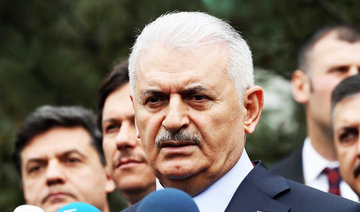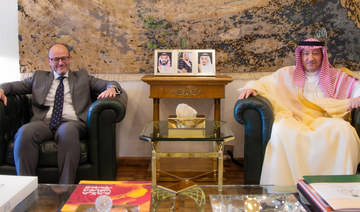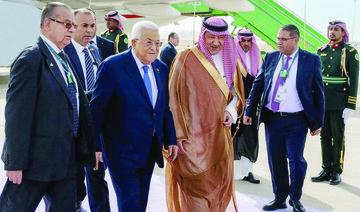BAGHDAD: Iraqi armed forces will prevent Kurdish militants based in northern Iraq from staging cross-border attacks against Turkey, Iraqi Prime Minister Haider Al-Abadi said on Tuesday.
Abadi’s pledge, made during a phone call with Turkish Prime Minister Binali Yildirim, came a day after Ankara threatened to intervene directly if the Iraqi operation against the militants based in the Sinjar region failed.
Turkey has long complained that fighters of the outlawed Kurdistan Workers Party (PKK) are being given free rein to operate out of Sinjar against Turkish targets.
“Iraqi security forces have been instructed not to allow the presence of foreign fighters in the border region,” Abadi’s office quoted him as telling Yildirim in their conversation.
The chief of Iraq’s military General Staff, Lt. Gen. Othman Al-Ghanmi, echoed that message during an inspection tour on Tuesday of troops deployed in Sinjar, the state-run news website Iraqi Media Network reported.
“The Iraqi army is in full control of Sinjar and the border strip with Turkey,” it quoted him as saying.
On Monday Turkish President Tayyip Erdogan said Turkey’s intelligence chief would meet an Iraqi official to discuss the Iraqi military operation in Sinjar.
Erdogan said Turkey would do “what is necessary” if the Iraqi operation failed, raising the prospect of a possible direct Turkish military operation.
Turkish forces are currently waging a full-scale military operation in the Afrin region of northern Syria against the US-allied YPG Kurdish militia that Ankara says has close ties to the PKK.
The PKK, which is classified as a terrorist organization by the United States and the European Union as well as by Turkey, has waged an insurgency against the Turkish state for decades. It has been based in Iraq’s Qandil mountains near the border with Iran for decades.
Sources in northern Iraq said last Friday the PKK would withdraw from Sinjar, where it gained a foothold in 2014 after coming to the aid of the Yazidi minority community, who were under attack by Daesh militants.
Iraq will prevent militant Kurdish attacks on Turkey — PM Abadi
Iraq will prevent militant Kurdish attacks on Turkey — PM Abadi

Frankly Speaking: Where will Gazans go after Rafah’s invasion?

- Arab League general secretary says Israel wishes to see Palestinians disappear from occupied territories
- Israel has killed at least 35,000 Palestinians, including women and children, in Gaza since October 7 last year
DUBAI: If Arab countries really cared about Gaza, they would throw open their borders to Palestinian refugees. That is a claim made repeatedly by Israel since the Hamas-led attack of Oct. 7 last year sparked the conflict in the Gaza Strip.
According to Ambassador Hossam Zaki, assistant secretary-general to the Arab League, this argument is deeply flawed — ignoring the fact that Arab nations already host millions of Palestinian refugees.
Furthermore, Zaki believes this argument ignores the stark reality that once the people of Gaza are displaced, the Israeli government is unlikely to permit their return — opting instead to seize the land for the state of Israel.
“If we really want the truth, the Israeli wish is to see that the Palestinian population would disappear from the Occupied Territories,” Zaki told Katie Jensen, host of the Arab News current affairs program “Frankly Speaking.”
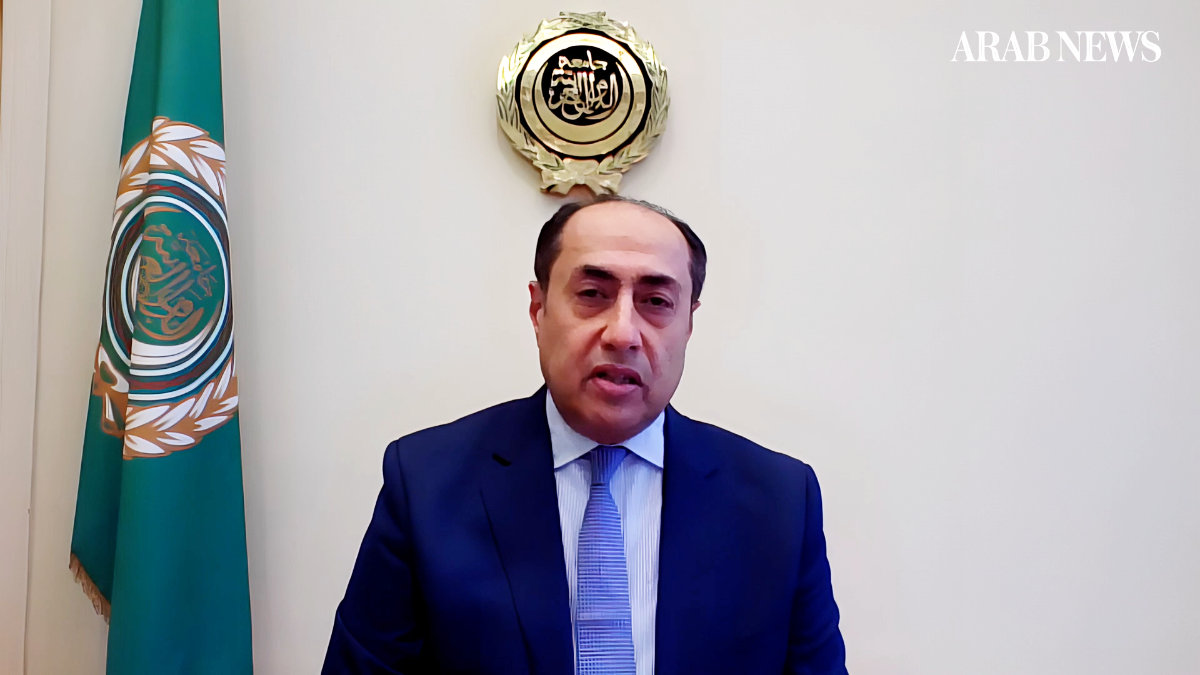
He added: “From the West Bank, East Jerusalem and Gaza, they would love for the Palestinians just to vanish. We all know that, because we know that they want the land. They want to grab the territory. They want to annex the territory to their state.”
In a wide-ranging interview, in which he discussed the forthcoming Arab League summit in Bahrain on May 16, efforts to halt Israel’s assault on Rafah, and the diminishing prospects for a two-state solution, Zaki said previous mass displacements would not be repeated.
“The Palestinians have learned from the mistakes of the past — from the 1948 war and 1967 war — that once they move out of their territory, the territory is confiscated by Israel, taken under control by Israel. And it seems to be such an uphill battle to get it back,” he said.
“The hope of getting back territory is ever so pale. So, what we are doing is, we are assisting the Palestinians to hold on to their territory, to hold on to their land, and not to move out of the land, because they know the consequences of moving out.”
Zaki was equally vehement in his rejection of the Israeli suggestion that the Arab states had failed to offer sanctuary to Palestinian refugees.
“They (the Israelis) can criticize us all they want,” he said. “We have Palestinians living in all Arab countries, some in refugee camps — very, very few — but most living like the normal citizens of these countries.
“In Egypt and in the Gulf countries, in Jordan, in North Africa, all Arab countries, you have Palestinians living.
“Normally, that is a criticism that we are willing to take, because we know that whatever is said in this regard means only to evacuate the territory for the benefit of the Israelis who want to grab it.”
Since the war in Gaza began seven months ago, the Arab League has been actively involved in trying to secure a ceasefire between Israel and Hamas, to arrange for sufficient aid to enter the enclave, and to keep the goal of Palestinian statehood on the agenda.
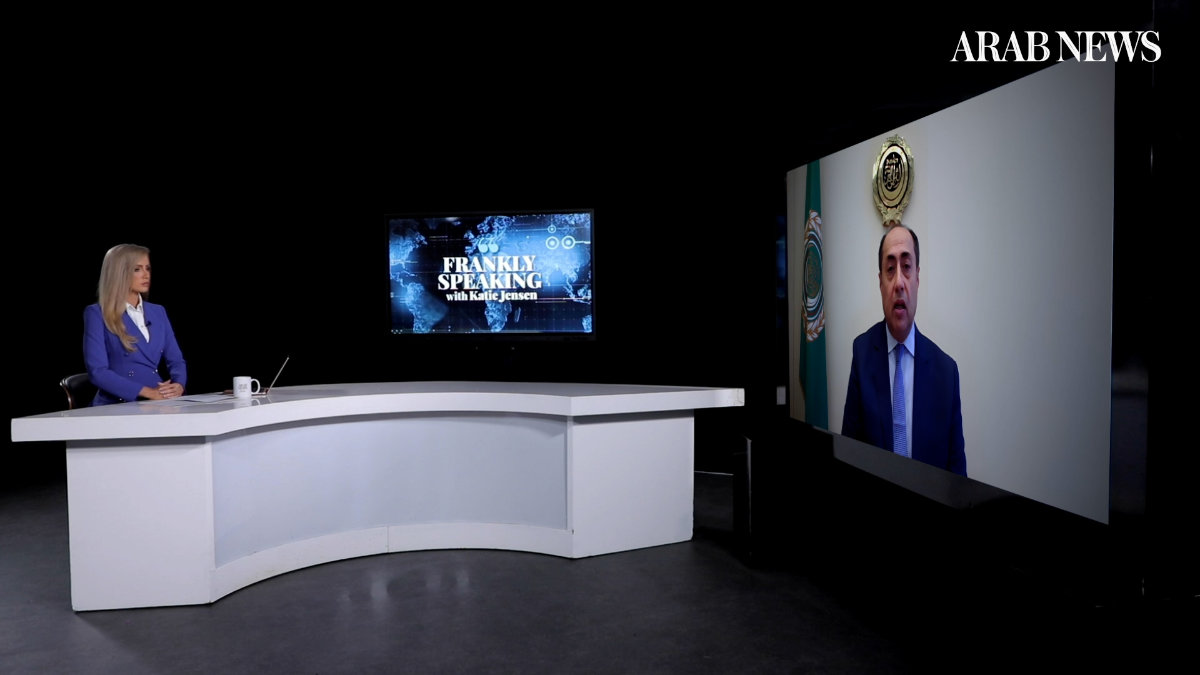
Zaki said the Arab League and its “heavyweight members” — including Egypt, Saudi Arabia, Qatar, the UAE, and Jordan — had continued to promote the Arab Peace Initiative, first unveiled 20 years ago, and were working to stop the “killing madness” continuing.
“But nothing has been successful so far,” he said. “Even the only resolution that the UN Security Council was able to adopt in order to stop the war, to cease the fire, was not implemented. It’s been adopted since, what, one month now? Nothing. As if there is nothing.”
Zaki believes Israel has been allowed to act with impunity owing to the protection and largesse of the US.
“Israel is basically a country that is pampered by the US, pampered by many of its allies, accomplices, so-called friends in the West,” he said.
“They condone what it is doing and they cannot stop it. They cannot stop this madness. Unfortunately, they gave it a carte blanche since the beginning and this is where we are.
“Seven months in this war — this criminal war — and nothing is happening. They are not capable of reigning in this country, this government of extremists.”
Asked whether the Arab League itself shares part of the blame for failing to bring an end to the conflict, Zaki laid responsibility entirely on Washington.
“Why would we — how could we — blame the Arab League?” he said. “The Arab League is not an accomplice in this. The Arab League is not giving bombs to Israel. The Arab League is not giving ammunition to Israel. The Arab League is not funding the Israeli aggression.
“The Arab League is a regional organization, a respectable regional organization, that is seeking peace, that is talking politics. It’s a diplomatic organization. We are willing to engage with whomever is seeking peace as well on the other side.
“Why do we say the US and the West? Because it is the US that’s funding Israel. It keeps transferring money to Israel, aid to Israel, munitions, bombs, weapons, whatever — you name it.”
Israel’s months-long bombardment and strangulation of aid flows has devastated Gaza’s infrastructure. Zaki believes Israel has deliberately sought to make Gaza inhospitable to compel the Palestinian population to abandon their land and accept refugee status abroad.
“The Israelis, in the nasty, very nasty, war against the Palestinians in Gaza, what they’re trying to do is not only to kill Palestinians … they did something which is much more nasty, actually: They have destroyed the infrastructure of the Gaza Strip,” he said.
“They’ve destroyed the health infrastructure, the education infrastructure, the water infrastructure, the electricity infrastructure. This is mean and malignant, and they want to make it a point for the Palestinians who remain in the Gaza Strip — most of the inhabitants — to find this place uninhabitable.
“When the war ends, all the Palestinians would look around and see that this has become totally uninhabitable, so they would want to leave. But surprise to them, I would tell you from now — and mark my words — that is not going to happen.
“They’re going to reconstruct their state, their country. They’re going to reconstruct Gaza, and the Arabs are going to help them. You bet on that. And the international community has enough decent people, enough peace-loving people, who believe in Palestinian rights and who will help them rebuild their country after all the crimes that Israel has committed there.”
Furthermore, Israel has threatened to take over the Philadelphi Corridor — a narrow strip of land along the Gaza-Egypt border, established under the Philadelphi Accord in 2005 and which authorized Egypt to deploy 750 border guards to police its side of the border.
If Israel were to seize control of the Philadelphi Corridor, it could undermine the 1979 Egypt-Israel peace treaty, in which Israel agreed to withdraw from the Sinai in exchange for peace with Egypt and created the current border that bisects Rafah.
“They are playing with fire, and I think they know that,” said Zaki, himself an Egyptian diplomat.
“Those who are taking decisions on the Israeli side are taking a big risk. I do not think that, in their right mind, they would want to see an undermining of the main pillar of peace in the region, which is the Egyptian-Israeli peace treaty of 1979.”
Preparations are underway for the 33rd Arab League summit, during which the leaders of the 22 member states will discuss common challenges facing the region.
With multiple conflicts blighting the Middle East and North Africa, Zaki said there would be “a hefty agenda” this year. “Obviously the issue of the war on Gaza is going to be left, right and center in all of this,” he said.
“Sudan is a big issue for us. The war on Sudan has not receded. It’s been going on for more than a year. It’s unfortunate. We need to address that. The situation in Libya. The situation with Yemen is still a problem. Syria is still an issue for us.
“And, we have a set of other socioeconomic resolutions that are prepared for the leaders to adopt in their meetings. So we do have quite a hefty agenda for our summit this year.”
High on that agenda will no doubt be the prospects of reviving the two-state solution for the Israeli-Palestinian conflict.
“There is no alternative to that solution,” said Zaki. “The Palestinians should have their own state. They should have their own independent contiguous state. Nothing should stand in their way and nothing, really, should justify assisting Israel in diluting this solution.”
But, given the destruction in Gaza, the ongoing spread of settlements in the West Bank, and the deep hostility felt on both sides, some might argue the region is moving further away from the two-state solution.
“No, we’re not moving further away,” said Zaki. “I think the world — which has pretty much paid lip service to this two-state solution for a couple of decades now — is now realizing that, well, lip service is not useful anymore, and we should really engage in active steps, like many European leaders have been saying, active steps.
“Even US Secretary of State Antony Blinken said that several months ago. We should all engage in active steps to make true the Palestinian state — to make it come about and to make it a reality.
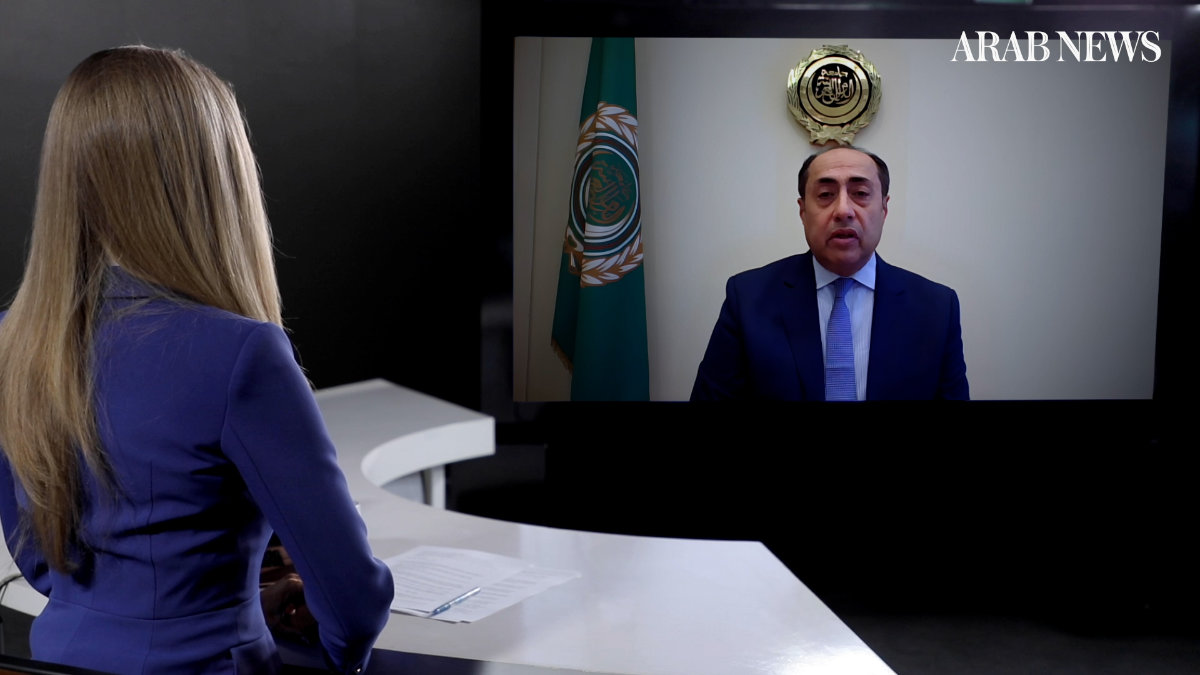
“This is going to happen in the UN; one step closer, one step closer to Palestinian statehood. And things are going to move in this direction.
“The Israelis will have to resist that as they want to, and as they refuse to engage in peace talks, and they refuse to agree on Palestinian statehood. But it’s not up to them.
“We are trying to convince the rest of the world, especially the Western world, that Palestinian statehood should not be subject to an Israeli veto. Because if we do give the Israelis the veto over this, I think they will never agree on it. And a Palestinian state will never see the light of day.”

India vote to resume with Kashmir poised to oppose Modi

- Jammu and Kashmir has deeply resented Modi government’s 2019 snap decision to bring territory under its control
- Rebel groups opposed to Indian rule have waged an insurgency since 1989 on frontier controlled by New Delhi
SRINAGAR, India: India’s six-week election is set to resume Monday including in Kashmir, where voters are expected to show their discontent with dramatic changes in the disputed territory under Prime Minister Narendra Modi’s government.
Modi remains popular across much of India and his Hindu-nationalist Bharatiya Janata Party (BJP) is widely expected to win the poll when it concludes early next month.
But his government’s snap decision in 2019 to bring Kashmir under direct rule by New Delhi — and the drastic security clampdown that accompanied it — have been deeply resented among the region’s residents, who will be voting for the first time since the move.
“What we’re telling voters now is that you have to make your voice heard,” said former chief minister Omar Abdullah, whose National Conference party is campaigning for the restoration of Kashmir’s former semi-autonomy.
“The point of view that we want people to send out is that what happened... is not acceptable to them,” he told AFP.
Kashmir has been divided between India and Pakistan since their independence in 1947. Both claim it in full and have fought two wars over control of the Himalayan region.
Rebel groups opposed to Indian rule have waged an insurgency since 1989 on the side of the frontier controlled by New Delhi, demanding either independence or a merger with Pakistan.
The conflict has killed tens of thousands of soldiers, rebels and civilians in the decades since, including a spate of firefights between suspected rebels and security forces in the past month.
Violence has dwindled since the Indian portion of the territory was brought under direct rule five years ago, a move that saw the mass arrest of local political leaders and a months-long telecommunications blackout to forestall expected protests.
Modi’s government says its canceling of Kashmir’s special status has brought “peace and development,” and it has consistently claimed the move was supported by Kashmiris.
But his party has not fielded any candidates in the Kashmir valley for the first time since 1996, and experts say the BJP would have been roundly defeated if it had.
“They would lose, simple as that,” political analyst and historian Sidiq Wahid told AFP last week.
The BJP has appealed to voters to instead support smaller and newly created parties that have publicly aligned with Modi’s policies.
But voters are expected to back one of two established Kashmiri political parties calling for the Modi government’s changes to be reversed.
India’s election is conducted in seven phases over six weeks to ease the immense logistical burden of staging the democratic exercise in the world’s most populous country.
More than 968 million people are eligible to vote in India’s election, with the final round of polling on June 1 and results expected three days later.
Turnout so far has declined significantly from the last national poll in 2019, according to election commission figures.
Analysts have blamed widespread expectations that Modi will easily win a third term and hotter-than-average temperatures heading into the summer.
India’s weather bureau has forecast more hot spells in May and the election commission formed a taskforce last month to review the impact of heat and humidity before each round of voting.
Pakistan president urges settlement of Azad Kashmir price hike issue through ‘dialogue’

- The remarks came during President Asif Ali Zardari’s meeting with members of the Azad Kashmir Legislative Assembly
- On Saturday, clashes erupted in the territory between police and protesters demanding cheaper wheat flour, electricity
ISLAMABAD: President Asif Ali Zardari on Sunday urged all stakeholders to exercise restraint and resolve the price hike issue in Azad Kashmir through “dialogue and mutual consultation,” Pakistani state media reported, amid protests in the territory for subsidized wheat flour and cheaper electricity.
The Pakistan president said this during his meeting with a delegation of members of the Azad Jammu and Kashmir (AJK) Legislative Assembly, who belonged to the Pakistan Peoples Party (PPP), in the Pakistani capital of Islamabad.
The statement came a day after clashes erupted between police and supporters of the Jammu Kashmir Joint Awami Action Committee (JAAC) in various parts of the territory, resulting in the killing of a police officer and injuries to 90 others on both sides, according to officials.
The protests turned violent when police attempted to stop a rally headed for Azad Kashmir’s capital of Muzaffarabad from Kotli and Poonch districts. The protesters are demanding electricity as per hydropower generation cost in Azad Kashmir, subsidized wheat flour, and an end to privileges enjoyed by the elite.
“The President said political parties, state institutions and the people of AJK should act responsibly so that hostile elements could not exploit the situation to their benefit,” the Radio Pakistan broadcaster reported.
“The President highlighted that the demands of the people of AJK should be addressed as per law. He said that he would take up the grievances of the people of AJK with Prime Minister Shehbaz Sharif to find a way out of the current situation.”
The Himalayan territory of Kashmir has been divided between India and Pakistan since their independence from Britain in 1947. Both countries rule part of the territory, but claim it in full and have fought three wars over the disputed region.
Sharif earlier said peaceful protests were a democratic right, but there should be “no tolerance” for violence, adding that he was “deeply concerned” over the situation in Azad Kashmir.
“Unfortunately, in situations of chaos and dissent there are always some who rush in to score political points,” he said on X. “While debate, discussion and peaceful protests are the beauties of democracy, there should be absolutely no tolerance for taking the law in one’s own hands and damaging government properties.”
The western portion of the larger Kashmir region is administered by Pakistan as a nominally self-governing entity, where the protesters have been calling for subsidy on wheat flour and electricity among other demands.
Pakistan last year narrowly avoided a default on the payment of foreign debts when the International Monetary Fund and several friendly nations came to its rescue by giving it loans.
Pakistan’s monthly inflation rate at one point reached over 40 percent, but authorities say it has come down to 17 percent ahead of talks with the IMF for a new bailout. Islamabad plans to get at least $6 billion from the lender when it reaches a deal expected in the coming months.
Saudi deputy FM receives US deputy assistant secretary of state
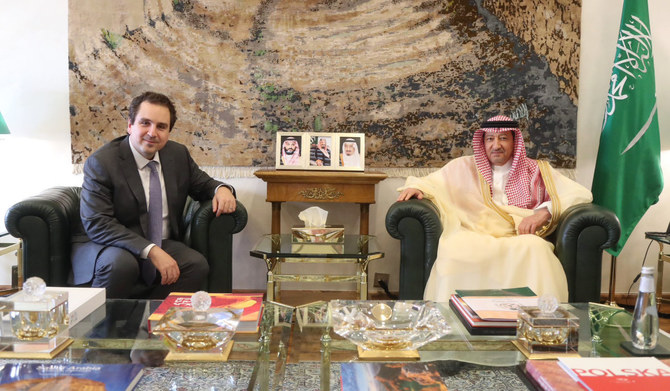
- The most prominent regional and international developments discussed
RIYADH: Saudi Deputy Minister of Foreign Affairs Waleed Elkhereiji received Daniel Benaim, US deputy assistant secretary of state for Arabian Peninsula affairs, in Riyadh on Sunday.
The two sides discussed strengthening Saudi-US relations and ways to enhance cooperation, the Saudi Press Agency reported.
The most prominent regional and international developments were also discussed, as well as the efforts put forth in these areas.
Japan’s military needs more women. But it’s still failing on harassment.

- Calls to root out harassment and increase the number of servicewomen come as aging Japan faces rising threats from China, North Korea and Russia and navigates the burdensome legacy of its wartime past
TOKYO: As Japan embarks on a major military build-up, it’s struggling to fill its ranks with the women that its forces need and its policymakers have pledged to recruit. Following a wave of sexual harassment cases, the number of women applying to join the Self-Defense Forces (SDF) decreased by 12 percent in the year ending March 2023, after several years of steady growth. Some victims have said an entrenched culture of harassment could deter women from signing up.
But nine months after the defense ministry pledged to take drastic measures, it has no plans to take action on a key recommendation issued by an independent panel of experts — implementing a national system for reviewing anti-harassment training standards — according to two ministry officials responsible for training.
The government-appointed panel had identified in a report published in August that the military’s superficial harassment education — which made only limited mention of sexual harassment — and a lack of centralized oversight of such training were contributing factors to cultural problems within the institution.
The head of the panel, Makoto Tadaki, said some training sessions — one of which Reuters attended — were at odds with the gravity of the situation.
A servicewoman who is suing the government over an alleged sexual harassment incident also said in an interview that the education she received over the past 10 years was ineffective.
Calls to root out harassment and increase the number of servicewomen come as aging Japan faces rising threats from China, North Korea and Russia and navigates the burdensome legacy of its wartime past.
Women make up just 9 percent of military personnel in Japan, compared to 17 percent in the United States, Tokyo’s key security ally.
The SDF referred Reuters’ questions to the defense ministry, which said in an emailed response that harassment “must never be allowed, as it destroys mutual trust between service members and undermines their strength.”
The ministry said it had hosted harassment prevention lectures by external experts since 2023, made sessions more discussion-based and planned to invite specialists to review its training this year.
It did not respond to questions on whether it would implement the panel’s recommendation to centralize oversight of training. After ex-soldier Rina Gonoi went public with allegations of sexual assault in 2022, the defense ministry conducted a survey that year that uncovered more than 170 alleged sexual harassment incidents in the SDF. Another alleged victim was an Okinawa-based servicewoman who accused a senior of making lewd remarks toward her in 2013. She was then publicly named in harassment training materials distributed to her colleagues in 2014, she told Reuters. The alleged perpetrator was not identified in the materials.
Reuters does not name alleged victims of sexual harassment. Her allegations were corroborated with documents in the lawsuit she filed last year, after she said she exhausted an internal complaints process.
HAPHAZARD TRAINING
The defense ministry offers an annual online module on general harassment. It also provides training materials to officers for in-person sessions, but doesn’t offer training on delivering harassment education and doesn’t track how or when the officers carry out harassment training, the two defense officials said.
The officials, who spoke on condition of anonymity due to the sensitivity of the matter, justified the existing system as offering flexibility to commanders.
The six experts concluded in their review that existing training amounted to “generic, superficial statements” that were “not effective in helping people apply the training in the real world.”
In April, Reuters attended a harassment prevention course delivered by an external instructor to over 100 mid-ranking military officers at a base on the outskirts of Tokyo.
Instructor Keiko Yoshimoto presented harassment as a communication issue and focused discussions on generational differences and how they played out in preferences for types of cars and flavours of crisps.
“Generational differences make it hard for people to communicate,” she said, adding that people should understand the basics of communication before they could deal with specifics around sexual harassment.
Law professor Tadaki, who separately witnessed part of Yoshimoto’s session, said it “did not feel like the sort of training you would expect against a backdrop of there being so many cases of harassment surfacing.”
He added that it would likely take more time to increase oversight over the quality of training.
Two months after the panel issued its report, local media reported that a sailor had in 2022 been ordered against her will to meet a superior that she had accused of sexual harassment. She later quit the SDF.
Gonoi and the Okinawa-based servicewoman have criticized the system as inadequate.
“People would say ‘everyone put up with that kind of behavior, it was normal back in our time,’ – but these issues are being passed down to my generation because nothing was done to stop it,” the servicewoman told Reuters in March.
She added that the harassment training she has since received was often poorly conducted and that more centralized oversight was needed: “Rather than trying to make a point about sexual harassment, (officers) pick materials that are easy to teach, something that will fit into the time they have.”
FEAR OF COMPLAINTS
The defense ministry officials said that training on sexual harassment largely takes place within a broader anti-harassment curriculum. At the two-hour training session attended by Reuters, about two minutes were dedicated to sexual harassment.
When Reuters asked about sexual harassment incidents during interviews with the officials, as well as two senior uniformed officers, they responded by speaking about general harassment.
The officials said it was challenging to give standardised training on harassment because service members in high-stress environments may give orders in a direct way that is unusual in other circumstances.
The two officers said there were concerns within the military that too much focus on harassment could create operational issues and one suggested it might lead to unfair complaints.
The defense ministry said in a statement that it does not tolerate abuse and that its training aims to ensure commanders do not “hesitate to give necessary guidance on the job because they are concerned about harassment.”
Tadaki, the professor, said Japan could learn from other militaries.
“The US, UK, and France have a much clearer focus on preventing harassment from its root causes so its prevention program is structured around improving the internal climate and culture of its organization,” he said.


